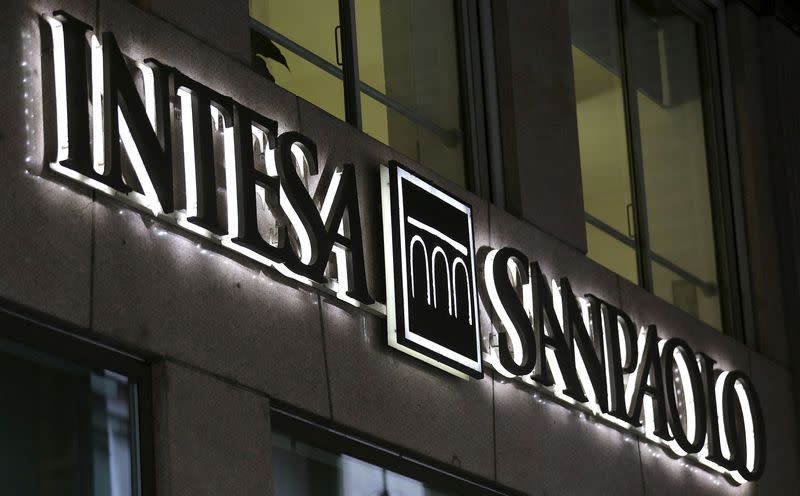Exclusive-Intesa closer to Russia approval on exit as Moscow stance shifts -sources

By Valentina Za and Alexandra Schwarz-Goerlich
MILAN (Reuters) -Italy's biggest bank Intesa Sanpaolo is getting closer to securing approval from Moscow to transfer its Russian business to local management, a source close to the matter said, as the country's stance on asset disposals shifts.
Intesa has said in the past that it was working "to select counterparties" to offload its Russian business to, but it has not disclosed progress on the matter. News that it is close to receiving approval for the exit has not been reported before.
A spokesperson for Intesa Sanpaolo declined to comment.
Laws that Moscow introduced after it invaded Ukraine in February last year have made presidential approval necessary for banks such as Intesa to cut ties with their local business.
A decree signed last August by President Vladimir Putin gave him the power to issue special waivers for certain deals to proceed.
A final sign-off is still pending and there is no certainty it will be granted, the person told Reuters, requesting anonymity because the matter is private.
Intesa serves corporate clients in Russia, where it had around 980 employees at the start of the war across 28 branches. It stopped new financing to Russian clients and fresh investments in Russian assets when the war broke out.
Pressured by European banking supervisors to cut ties with Russia, Intesa has been working on reducing its exposure, which also includes cross-border loans.
At the end of June, Intesa had 700 million euros in cross-border loans to Russian clients net of provisions and export credit guarantees, down 77% year-on-year. Local loans totalled 100 million euros, down 66% from a year before.
Overall, Russia accounts for just 0.2% of client loans across the bank.
Since last year Intesa has tried to sever ties with its local business but Western sanctions hitting potential buyers have made it difficult for European banks, including rival UniCredit and Austria's Raiffeisen Bank (RBI) , to exit Russia.
RBI CEO Johann Strobl said this month "there is interest out of Russia on acquiring the bank".
Another person with knowledge of the matter said concern was growing in Moscow about having systemically important banks in the hands of "non friendly" countries.
The change in Moscow's stance could ease RBI's plans to get out by speeding up government approval, although the timing of any such move is impossible to predict and could be weeks or months, the person said.
A spokesperson for RBI was not immediately available for comment.
Russian media has previously reported on possible exit options, including the potential transfer to local management led by Intesa Russia Chairman Antonio Fallico.
Fallico did not respond to requests for comment.
The green light to Intesa could lead to similar approvals for other lenders still entangled in Russia, which are increasingly under pressure by the European Central Bank to cut a presence seen as carrying reputation and financial risks.
At the start of August, Intesa said it was closing its representative office in Moscow, adding that it did not affect its local business with its subsidiary still operating.
(Reporting by Valentina Za in Milan and Alexandra Schwarz-Goerlich in Vienna; editing by Bernadette Baum)

 Yahoo Finance
Yahoo Finance 